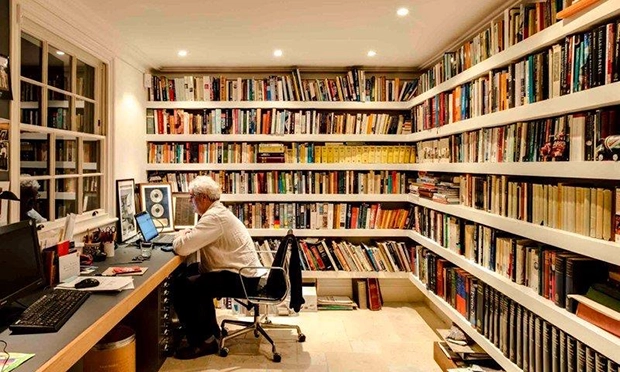‘It’s all down to the friendliness of the authors’: One-man Hackney publishing house built on a personal touch gets ready to celebrate five-year anniversary

Mensch’s founder and sole employee Richard Charkin at work. Photograph: courtesy Richard Charkin
A former executive who challenged himself to set up his own publishing house is just where we wants to be after almost half a decade.
Richard Charkin started Mensch Publishing after many years at industry titans such as Macmillan and Oxford University Press.
But he decided to branch out on his own with the aim of being as fair as possible to authors.
“I’ve been in the industry to for a long time,” he told the Citizen. “One thing that really irritates me is publishers standing up and crowing about their commitment to this and that.
“All we are as publishers are facilitators between author and reader. I recognise my role as a publisher is subservient to everyone in the chain — starting from the author and ending with the reader.”
Charkin named his publishing house Mensch, which means a person of integrity and honour.
With the business’s five-year anniversary approching, he is proud that he has stayed true to his vision of being a small publisher who prioritises a personal touch and a close relationships with authors.
Charkin says his authors are often his friends, or have become them, and he sends them a letter every quarter acknowledging how their books are doing.
The smaller scale of his business allows him to give 25 per cent in royalties to every writer.
This rate is universal – unlike some big publishers – leaving little need for authors to hire expensive agents for negotiations.
“It would be wrong for me to make exceptions for one author against an other,” Charkin explained.
He’s come a long way since his wife gave him an ultimatum when he was setting up Mensch. She told him he was allowed to lose £10,000 on the business and no more.
With this initial start-up sum in his bank, he got the ball rolling and hasn’t lost money on a book since.
Charkin’s choice of books are primarily non-fiction, ranging from military history and chef Delia Smith’s You Matter to famous jeweller Theo Fennell’s hilarious biography, I Fear for This Boy.
“Theo Fennell came to me through my friend the novelist William Boyd,” Charkin revealed. “He thought Theo was one of the greatest writers around, even though he had never written a book before. But he just has a facility with sentences to produce something entertaining.”
Mensch has just sold the TV rights for the book, which Fennell wrote during lockdown.
Charkin said: “I somehow feel like fiction is better handled by the big publishers. I also don’t do children’s because it is quite specialist and it helps to understand.
“I choose the books on the friendliness of the authors. It’s all down to whether they like me and I like them.”
He even involves authors in reading submissions.
One of Mensch’s first books was Time To Go by Guy Kennaway, described as a “terribly funny” account of his mother’s pleas for him to assist with her suicide.
When Charkin rejected his next submission from a different author, which also happened to be about old age, he was persuaded to send it to Guy Kennaway’s mother for a second opinion.
“She thought it was really good, so I took the book on,” he said.
These personal touches are possible because Richard operates as the sole employee.
He proofreads everything himself and uses freelancers for production and design.
Mensch publishes usually between five and 10 books a year and has been sent 300 since it was founded.
Charkin said: “Nowadays either books are really big and sell in huge quantities or they just disappear. I’m publishing the ones that aren’t necessarily as big, which huge publishers would find it hard to do.
“It’s becoming ever more difficult for non-bestsellers to find any space at publishers.”
He highlighted huge competition as the reason for such polarised rates of author success.
“It is rumoured there are one million completed books in English alone looking for a publisher at any one time. An author can send a book to 50 publishers at a time.
“Understandably, big publishers won’t look at books which don’t come from literary agents. The big publishers are overdependent on one-off best sellers. They need a book like Spare once a year.”
Charkin believes smaller independent publishers are steadily gaining success because fewer staff means they can be “lighter on their feet”.
His ability to reply to book submissions within 24 hours is one trump card.
“With big publishers, there are probably five or six layers of management between the decision on whether to publish a title.
“The bigger a company is, the more important it is to have that because they’ve got to have control, but it does slow things down.”
Charkin is glad to have followed in the footsteps of his grandparents – first-generation immigrants who settled in Hackney.
“They were all able to start businesses, so I owe a lot to them and to things like the public libraries.
“They didn’t have any money, but they could learn.”
